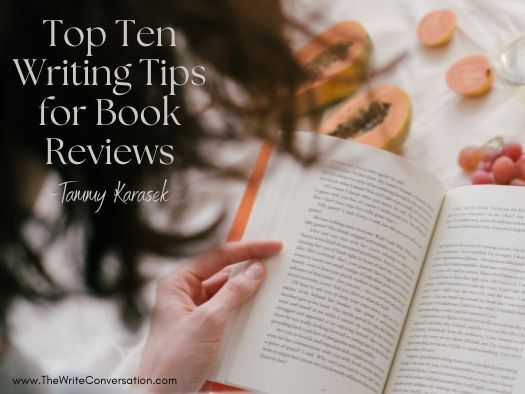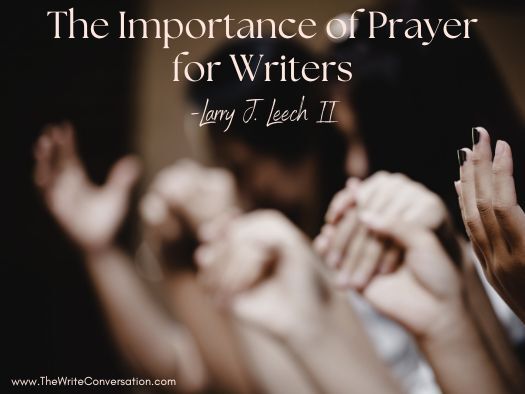Edie Melson's Blog, page 21
March 17, 2025
Writers Write: How to Keep Writing When You Don’t Feel Like It – 5 Key Strategies

by Katherine Hutchinson-Hayes @KHutch0767
My mentor once impressed upon me the importance of consistency in writing, emphasizing that if I wanted to be a writer, I had to make it a non-negotiable part of my daily life—no excuses allowed. This advice resonated deeply, but it was my husband who truly took it to heart, encouraging me to create a dedicated home office space that would nurture my creativity and focus. His unwavering support has been instrumental in my journey, reminding me that every day I write, I’m one step closer to realizing my dream. Together, their encouragement has instilled in me a sense of discipline and determination that has become the foundation of my writing practice.
However, the truth is that even the most passionate writers face days when the words seem to hide. The blank page can feel more like a challenge than a canvas for creativity. However, writing isn’t just about waiting for inspiration to strike—it’s about building habits, embracing imperfections, and learning to push through even when motivation is low.
Five Key Strategies to Help You Keep Writing When You Don’t Feel Like It
1. Establish a Daily Writing Routine
One of the best ways to overcome a creative lull is to commit to a routine. By setting aside a specific time each day to write, you create a dedicated space in your schedule that becomes non-negotiable. Whether early in the morning or late at night, having a regular writing session trains your mind to expect and prepare for creative work. Even if you start with just 15 or 20 minutes, this consistent practice builds momentum, making it easier to transition into longer writing sessions.
Tip: Consider using techniques like the Pomodoro Technique—25 minutes of focused writing followed by a 5-minute break—to maintain productivity without feeling overwhelmed.
2. Embrace Imperfection and Free Write
Perfectionism can be a formidable barrier to writing. The pressure to produce flawless work on the first try can lead to endless self-editing and, ultimately, writer’s block. Instead, give yourself permission to write badly. The goal is to get your ideas on paper, not to create a masterpiece with every sentence. Allow your thoughts to flow freely without judgment.
Tip: Set a timer for 10 minutes and write without stopping. Don’t worry about grammar, style, or coherence. The focus is on generating content that you can refine later. Often, the act of free writing can unlock unexpected ideas and perspectives.
3. Use Writing Prompts and Exercises
When the well of inspiration feels dry, writing prompts can serve as a spark to ignite your creativity. Prompts are designed to bypass the internal critic and encourage you to explore new ideas or revisit forgotten themes. Whether it’s a single word, a question, or a scenario, prompts can offer the right nudge to get your creative gears turning.
Tip: Keep a list of favorite prompts or subscribe to a daily writing prompt newsletter. Over time, you might discover a specific prompt style that resonates with your voice, turning it into a reliable tool during creative droughts.
4. Create a Distraction-Free Environment
Your physical and digital surroundings profoundly impact your ability to focus. Establishing a dedicated writing space can signal your brain that it’s time to concentrate. Clear away distractions—whether that means turning off your phone, using noise-cancelling headphones, or setting up a tidy desk in a quiet corner of your home.
Tip: Experiment with ambient sounds or instrumental music to create a soothing backdrop that enhances focus. Over time, your environment will become a cue that helps transition your mind into creative mode.
5. Hold Yourself Accountable
Accountability is a powerful motivator. Sharing your writing goals with friends, joining a writing group, or using accountability apps can create a supportive structure that encourages consistency. When you know someone is aware of your commitment, it’s easier to push through the days when you’re less motivated.
Tip: Consider setting weekly or monthly targets for your writing output. Celebrate small victories, and don’t be too hard on yourself if you miss a day. The goal is progress, not perfection. Sometimes, even a short note or a paragraph is a step forward.
Writing is both an art and a discipline. While inspiration is invaluable, the habits you build can carry you through the inevitable moments of doubt and inertia. By establishing a routine, embracing imperfection, leveraging prompts, creating a conducive environment, and holding yourself accountable, you’re setting the stage for a sustainable writing practice—even on the toughest days.
Remember, every writer experiences lows. What sets you apart is your commitment to keep writing despite them. So, pick up your pen or open your laptop, and let your words flow—because writers write, no matter what.
TWEETABLEWriters Write: How to Keep Writing When You Don’t Feel Like It – 5 Key Strategies - @KHutch0767 on @EdieMelson (Click to Tweet)
 Dr. Katherine Hutchinson-Hayes is a review board member and contributor to Inkspirations (an online magazine for Christian writers), and her writing has been published in Guideposts. Her work in art/writing is distinguished by awards, including the New York Mayor’s Contribution to the Arts, Outstanding Resident Artist of Arizona, and the Foundations Awards at the Blue Ridge Mountains Christian Writer’s Conference (2016, 2019, 2021). She is a member of Word Weavers International and serves as an online chapter president and mentor. She belongs to FWA (Florida Writers Association), ACFW (American Christian Fiction Writers), CWoC (Crime Writers of Color),
Dr. Katherine Hutchinson-Hayes is a review board member and contributor to Inkspirations (an online magazine for Christian writers), and her writing has been published in Guideposts. Her work in art/writing is distinguished by awards, including the New York Mayor’s Contribution to the Arts, Outstanding Resident Artist of Arizona, and the Foundations Awards at the Blue Ridge Mountains Christian Writer’s Conference (2016, 2019, 2021). She is a member of Word Weavers International and serves as an online chapter president and mentor. She belongs to FWA (Florida Writers Association), ACFW (American Christian Fiction Writers), CWoC (Crime Writers of Color),AWSA (Advanced Writers and Speakers Association), and AASA (American Association of School Administrators). She serves on the nonprofit organization Submersion 14 board and the 540 Writer’s Community board and is an art instructor for the nonprofit organization Light for the Future. Katherine hosts the podcast Murder, Mystery & Mayhem Laced with Morality. She has authored a Christian Bible study for women and is currently working on the sequel to her first general market thriller novel. Her thriller A Fifth of the Story will debut in February 2024 through Endgame Press.
Katherine flourishes in developmental editing and coaching writers. She has a twenty-year career in education, leadership, and journalism. Katherine freelances as an educational consultant for charter schools, home school programs, and churches. In this role, she has written and edited curriculum, led program development, and helped manage growth facilitating and public relations. She also works as an editor and book coach through her consulting business. Katherine provides skill, accountability, and professionalism so clients can begin, develop, and finish their writing projects for publication.
Published on March 17, 2025 22:00
March 16, 2025
Writers Can Reduce Stress by Following These 21 Tips

by DiAnn Mills @DiAnnMills
Writers are often stalked by a predator called stress. It’s a nasty disorder that can cause headaches, back and body pain, nausea, depression, problems in relationships, and a host of other physical and mental ailments. Not a pleasant malady.
The causes of stress are as many as how it manifests in our bodies. We get ourselves into an overwhelmed mode with edits, harsh critiques, rejections, writer’s block, looming deadlines, and self-imposed perfection. Who wants to deal with misery if there’s a solution?
These tips to reduce stress may also improve your physical and mental disposition.
21 Stress Reduction Tips for Writers
1. Remember why writing first excited you. Post it near your computer.
2. Accept you’re not perfect.
3. Determine rejections are redirections. Turndowns are of the manuscript, not the writer.
4. Get outside and enjoy nature.
5. Take a walk.
6. Eat a healthy diet. We are what we eat.
7. Journal the emotions that coincide with your stress.
8. Understand stress is a normal reaction, and it does help us accomplish great things.
9. Take a nap. Sleep deprivation solves nothing.
10. Learn how to say no. This means in your professional and personal life.
11. Schedule relaxation times. Read or enjoy a hobby.
12. Delegate tasks. Writer, no one expects us to be workhorses.
13. Consider a social media break.
14. Breathe in and out to calm yourself.
15. Determine when you write best: morning, afternoon, or evening.
16. List your priority of projects.
17. Pray. God gave you the gift of writing, and He will help you through the downtimes.
18. Practice laughing, a huge belly laugh.
19. Plan a getaway or retreat.
20. Try writing in a different spot.
21. Listen to soothing music.
We are fortunate to have the finest career on the planet. We create worlds out of words, love from a single smile, happiness from a touch, and friendships from unlikely people. A strong writer refuses to allow stress to destroy the art of communicating through the written world
What would you add to this list? Leave your stress-reduction tips in the comments section below!
TWEETABLEWriters Can Reduce Stress by Following these 21 Tips from @DiAnnMills on @EdieMelson (Click to Tweet)
 DiAnn Mills is a bestselling author who believes her readers should expect an adventure. She creates action-packed, suspense-filled novels to thrill readers. Her titles have appeared on the CBA and ECPA bestseller lists; won two Christy Awards; and been finalists for the RITA, Daphne Du Maurier, Inspirational Readers’ Choice, and Carol award contests.
DiAnn Mills is a bestselling author who believes her readers should expect an adventure. She creates action-packed, suspense-filled novels to thrill readers. Her titles have appeared on the CBA and ECPA bestseller lists; won two Christy Awards; and been finalists for the RITA, Daphne Du Maurier, Inspirational Readers’ Choice, and Carol award contests. She is the former director of the Blue Ridge Mountain Christian Writers Conference, Mountainside Marketing Retreat, and Mountainside Novelist Retreat with social media specialist Edie Melson. Connect here: DIANNMILLS.COM
Published on March 16, 2025 22:00
Top Ten Writing Tips for Book Reviews

by Tammy Karasek @TickledPinkTam
For authors, book reviews are important to the success of a book more than you can imagine. Whether you’re a reader, writer or an author, I believe you should make it a habit to go leave a review once you’ve finished a book. There are many places to leave them—Amazon, Barnes and Noble, BooksAMillion, BookBub, ChristianBook, Goodreads, Powells, Target, and more. It depends on where the book has been uploaded by a publisher or an independent published author.
Since 2012 I have served on or managed almost 400 launch teams. As of this writing, I haven’t had a review rejected. From that experience and following the ever-changing review rules for a large book-seller {grin}, I’ve created this helpful list for you to use in your book review process. Don’t let the long list scare you, it’s my hope to answer questions you may have in writing those reviews for an author as well as a reader trying to decide to buy the book or not! This list has been used in my Launch Team business and has kept rejected reviews to a minimum.
Best 10 Tips for Writing Book Reviews
1. Once you’ve read the book, write your review and save it in a Word document or somewhere you can easily copy and paste it when it’s time to post. This will set you up for success for your Amazon post during launch week, too! You can use the same review on all sites. If the site asks for a title, change the title up a bit if you’d like. My recommendation: is the book on Goodreads? Then write it there first, they usually accept reviews before a launch date. Then copy and paste from there.
2. If book retailers have the book already uploaded onto their site, you can post reviews as soon as they accept them. You cannot post a review on Amazon until launch day, but by having the review already written – you’re ready. The importance to do it on Launch Day, or at the very least is to push the sales rankings for the book and get the attention of Amazon to possibly share your book in other ads of books like yours. Not a guarantee, and there is no magic number of reviews.
3. A review only needs to be a few sentences, but can be longer if you chose. Not too long, though. Most people will not read a long review.
4. Do not write a summary of the book, copy and paste the back cover blurb, or copy and paste the book description at the top of the listing. By the time readers make it to the reviews, they already know what the book is about. They need a review of what the reader thought of the book.
5. THIS IS IMPORTANT! DO NOT REVEAL in any way that you know the author: don’t say author is my friend, neighbor, relative, etc. Your review WILL NOT be published. Also, Amazon will reject a review if you gush about the author, like: “this author always delivers in his/her writing.” The review needs to be about the book and the story, not the author in any way.
6. If you post a review on your blog, and you know the author, it’s fine to say you know the author or served on their Launch Team. Actually, doing so adds value to the review on your blog because of your personal connection. BUT only on a blog post.
7. What should the review say? Rate the book (not the author) honestly. If you loved it and think it’s worth reading then put lots of stars and tell readers what you liked about the book. Did you learn from it? Was there a quote or line you keep thinking about? You can add that into your review. Readers want to know if the book is worth a purchase and if you would recommend it to them.
8. If you’d like to add a photo on a review site that allows it, do so. But, DO NOT USE a photo or graphic from the author’s Launch Team. You can share a photo of the book that you take holding it, but not one from Launch Team graphics.
9. If you did NOT purchase a book, or not from that book seller, please include at the end of your review, a statement like this, in your own words: “I received this book from the publisher and was not required to leave a review. The honest opinion is my own.” And, it is not true that Amazon will reject reviews from people who didn’t purchase the book through them. It’s stated in their review guidelines they will accept. Don’t let people tell you to buy the book so you can leave a review. Only Walmart as of this writing has that rule and it is new as of fall 2024.
10. Not sure what to write? Read through other book reviews. Don’t be intimidated by the long reviews – these are not necessary. Less is best! Most people will not read through long reviews.
Bottom line, PLEASE post your reviews. The review works in many ways: it lets the publisher know what people think about this author’s writing, it allows readers to learn what other readers of that genre think of the book—and maybe a new to them author, and it helps with sales.
For those of you who are faithful book reviewers, thank you!
What about you? Do you leave reviews for books that you’ve read?
TWEETABLETop 10 Writing Tips for Book Reviews from @TickledPinkTam on @EdieMelson (Click to Tweet)
 Tammy Karasek uses humor and wit to bring joy and hope to every aspect in life. Her past, filled with bullying and criticism from family, drives her passion to encourage and inspire others and give them The Reason to smile. She’s gone from down and defeated to living a “Tickled Pink” life as she believes there’s always a giggle wanting to come out! A writer of Romance—with a splash of sass. She’s also The Launch Team Geek helping authors launch their books and also a Virtual Assistant for several best-selling authors. Don't miss her recent book, LAUNCH THAT BOOK, just released in November.
Tammy Karasek uses humor and wit to bring joy and hope to every aspect in life. Her past, filled with bullying and criticism from family, drives her passion to encourage and inspire others and give them The Reason to smile. She’s gone from down and defeated to living a “Tickled Pink” life as she believes there’s always a giggle wanting to come out! A writer of Romance—with a splash of sass. She’s also The Launch Team Geek helping authors launch their books and also a Virtual Assistant for several best-selling authors. Don't miss her recent book, LAUNCH THAT BOOK, just released in November. Her work was also published in a Divine Moments Compilation Book—Cool-inary Moments. She’s also the Social Media Manager for the Blue Ridge Mountains Christian Writers Conference, Founding President and current Vice-President of ACFW Upstate SC, and Founding President of Word Weavers Upstate SC. She’s a writing team member for The Write Conversation Blog, Novel Academy, MBT Monday Devotions, The Write Editing and more. Connect with Tammy at HTTPS://WWW.TAMMYKARASEK.COM.
Published on March 16, 2025 05:59
March 14, 2025
Tips for Creating a Fictional Dream for Your Readers

by Edie Melson @EdieMelson
Be a better writer when you know how to put your readers to sleep.
Nope the opening line above isn't a typo. You read it right. I'm suggesting skilled writers should put their readers to sleep.
Okay, maybe not completely to sleep, but at least allow them to dream. What does dreaming have to do with writing? Everything. The dream I’m referring to is the fictional dream. If you’ve never heard the term before, don’t worry. I guarantee you know what I’m talking about. I think author, John Gardner says it best.
“What counts in conventional fiction must be the vividness and continuity of the fictional dream the words set off in the reader’s mind.” -John Gardner
A fictional dream occurs when the world in the story you’re reading becomes more real than the physical world around you. We’ve all be there at one time or another—transported into another time or another place by an author’s well crafted words.
This experience is one that we try to create for our readers. And it’s one of the biggest differences between a good book and a great one. So how do we create this dream world? We do it by paying attention. Notice where you are right now. Are there sounds? Smells? Even if you’re not overwhelmed by your setting I bet you’re aware of it. The same thing is true for our characters. If we've written them as three dimensional people then they should notice and be affected by what's around them. However, if we neglect those details, we deny our readers the chance to be transported.
Even more important than what we do to put our readers to sleep is what we DON’T do. I think writers are far more often guilty of waking a reader up. We, as the author, have an obligation to not jolt our readers out of their fictional dream world. And each of us must become a skilled enough writer to put your readers to sleep!
7 Things that Can Interrupt Fictional Dreams1. Bad Grammar—I’m not talking about a missed comma or two. I’m referring to sentence structure that’s difficult to read, modifiers that modify the wrong thing or even complicated punctuation. All of these things can cause a reader to stop and ponder what you’re trying to say. Once they stop you’ve lost them, they’re awake.2. Confusing Dialogue—This can include things like long sections of dialogue with no speaker tags or beats. If the reader has to go back and figure out who’s speaking it means you’ve either not put in enough tags or your characters don’t have unique enough voices to be identified. One word of caution, overuse of ‘said’ instead of interspersing with speaker beats can be just as jarring.3. Creative Speaker Tags—Anytime you use a speaker tag other than said or maybe asked you run the risk of making your reader stop. The word said is so common place in literature that it’s almost invisible. The reader skims lightly over it, uninterrupted. If, on the other hand, you pull out your thesaurus and try to find other words to use in its place you end up with jarring prose that tells the story through speaker tags instead of dialogue.4. Characters who don’t act right—I’m not referring to moral actions. We’ve all read stories where a character does something and we find ourselves shaking our heads. Know your characters well enough to keep them from acting out of character.5. Overwriting a dialect—I’m not against allowing your character to speak with an accent or in a dialect, but be careful how you do it. When the character is first introduced you can use a heavier hand with the spellings that denote dialect, such as learnin’ instead of learning. But after the reader gets to know the character they can hear the character speaking in their head and you don’t have to use spelling to convey their voice. In fact, if the reader has to work too hard to decipher your intent they will never even make it into the fictional dream.6. Head Hopping—This is when you switch POV (point of view) from one character to another without a good reason. The rule of thumb is that each scene should have a single POV character and that should be the character with the most at stake.7. Poor Research—One time I was reading a book set in Houston and the opening scene talked about being on a hillside overlooking the lights of the city. Folks, Houston is FLAT. There are no hills that overlook the city—except maybe a very tall overpass or two. I didn't bother to read any further. The author lost me and I refused to go back.
The storyteller who can invite the reader into his world and make him believe it's real has captured the essence of what it means to be a great writer.
Now it's your turn. Have you ever read a book where you were jolted out of your fictional dream? What about one where you were transported to another world by an amazing author? Share your experiences and we'll compare notes!
And, don't forget to join the conversation!Blessings,Edie
TWEETABLETips for Creating a Fictional Dream for Your Readers from @EdieMelson (Click to Tweet)
 Edie Melson is a woman of faith with ink-stained fingers observing life through the lens of her camera. She’s a writer who feels lost without her camera and a card-carrying introvert who loves to encourage an audience. She also embraces the ultimate contradiction of being an organized creative. As a popular speaker, she’s encouraged and challenged audiences across the country and around the world. Her numerous books, including the award-winning Soul Care series reflect her passion to help others develop the strength of their God-given gifts and apply them to their lives.
Edie Melson is a woman of faith with ink-stained fingers observing life through the lens of her camera. She’s a writer who feels lost without her camera and a card-carrying introvert who loves to encourage an audience. She also embraces the ultimate contradiction of being an organized creative. As a popular speaker, she’s encouraged and challenged audiences across the country and around the world. Her numerous books, including the award-winning Soul Care series reflect her passion to help others develop the strength of their God-given gifts and apply them to their lives.She and husband Kirk have been married 43+ years, and live near their three sons and three grandchildren in the foothills of the Blue Ridge Mountains. Edie and Kirk can often be found with their big black dog hiking—Edie hanging off ledges for the best camera angle and Kirk patiently carrying her tripod. Connect with her on her website, www.EdieMelson.com and through social media.
Published on March 14, 2025 22:00
March 13, 2025
March Forward, Write Now

by Lilka Raphael @Lilka_Raphael
“You fail only if you stop writing.” – Ray Bradbury
Many writers measure their progress based on goals or resolutions. Almost a quarter into 2025, many resolutions are now a distant memory. However, one way to gauge success is by utilizing a quarterly countdown. By the end of March, I take inventory of what I’ve written (and have yet to write) so that I can recalibrate and target specific outcomes for June.
March is early enough in the year that if we haven’t accomplished much, we don’t feel that bad, yet it motivates us to get moving. If you have vowed to complete a project by the end of this year, have you started? For some authors, this equates to drafting twenty-five percent of a manuscript by the end of this month. For others, it may require completing a first round of edits.
If you haven’t written as much as you’d like, identify why. Writing is often a second job for many of us. Family obligations also disrupt the best of plans. Yet, we can’t achieve all that we would like if we don’t manage the things that keep us from writing. Is there anything you need to omit from your schedule? The most common obstacle I encounter is time. I eventually shifted my writing from late nights to early mornings to gain more of it. Routines that once produced multiple pages may no longer do so. It may take a few changes to determine what works for you in this season. If necessary, ask other authors how they stay on task. We’ve all had to adjust at some point to keep it going.
Maybe you need a bit of motivation. With conference season gearing up, explore something new. Step out and find out what’s trending. Interacting with editors, agents, and fellow authors is one of the most enjoyable aspects of a writing career. Professional relationships can solidify objectives and help us define our goals. Online workshops are also viable options. Whatever educational pursuits we choose should complement our current projects and provide insight for the goals we have already identified.
Stagnation defeats productivity. It can be incredibly difficult to regain momentum when we pause for extensive periods. Yet, pursuing agents, interviewing illustrators, or researching an idea all count toward progress. Grudgingly allocating an hour per day (or week) can yield more pages than we expect. When we consistently write, our imagination does the rest. Great ideas find us when we habitually look for them.
If you’ve been uninspired and dormant all winter, get moving again. Connect with other writers or do whatever inspires you to play with words. The most precious commodity we have is time. Let’s invest it wisely in 2025.
Brethren, I do not count myself to have apprehended; but one thing I do, forgetting those things which are behind and reaching forward to those things which are ahead,Philippians 3:13 NKJV
TWEETABLEMarch Forward, Write Now - @Lilka_Raphael on @EdieMelson (Click to Tweet)
 A Florida native, Lilka Finley Raphael has been a licensed pharmacist for over thirty years. Her passions for writing, gardening, and photography prompted her to share her experiences and life lessons on her blogs B Is for Blessed and God, autism, & me. You can learn more about her at lilkaraphael.com
A Florida native, Lilka Finley Raphael has been a licensed pharmacist for over thirty years. Her passions for writing, gardening, and photography prompted her to share her experiences and life lessons on her blogs B Is for Blessed and God, autism, & me. You can learn more about her at lilkaraphael.comLilka’s greatest achievements are her two adult sons who have flown the nest. Happily married for thirty-two years, she lives east of Atlanta with her husband, Rod. They now share their home with two German Shepherds—Holly and Ivy—and one naughty kitty, Moxie.
Published on March 13, 2025 22:00
March 12, 2025
A Bridge to New Writing Adventures

by Julie Lavender @JLavenderWrites
When my six-year-old grandson Benaiah visits, we always find new adventures. The older he gets, however, the riskier his adventures become.
During Hurricane Helene, a large oak tree fell across our small stream. Benaiah decided we should walk across the fallen tree. Now, I’m all for adventure, and the tree was really only about five feet above the ground. And the stream? Well, it was only about a foot wide and two inches deep.
I told him I’d just walk beside him—with my feet on the ground.
On his first trek across the tree, Benaiah wanted to hold my hand. He crept across, one foot in front of the other. When he got to the other side, he turned around carefully and walked back across.
The next time? He wanted to cross without holding my hand, but still needed me to walk next to him on the ground.
You can probably guess what happened next.
“Grandmommy, I want you to walk across the bridge with me. It’s fun.”
“Oh, no,” I said, shaking my head. “Not me.”
“You can do it, Grandmommy,” he said. “Be brave.”
Well, it’s hard for me to say no to my little guy, so, yes, this grandmommy followed her grandson up onto the trunk of the fallen tree. Benaiah led the way, and I inched across. Gingerly, slowly, cautiously.
And, you know what? Beniah was right. It was a fun, new adventure.
My trek across the stream reminded me of a recent writing project I tackled. For a long time, I’ve wanted to write educational books for children. When my biologist hubby retired, I decided the time was right to go for that new adventure.
Was it scary? Yes, it was to me, because educational writing is different than anything else I’d published. I proceeded with caution, although there was nothing “slow” about the adventure. Educational publishers, for whatever reason, typically work on very short deadlines. My husband and I wrote our first four educational books, Fox, Lemur, Seal, and Leopard, in about six weeks.
Was it fun? You better believe it! My hubby and I had a blast researching, writing, working together, and revising. It truly was an adventure.
I’m glad I took that first step. Those four books led to additional work—an assignment to do three six-book series – eighteen books in all!
The work is fast and furious, but we love it. We’re looking forward to even more educational projects on this writing journey.
Have you thought about taking a leap into a new writing genre? Maybe you’d like to try your hand at writing devotions or a magazine article. Or maybe you’ve published fiction but would like to dip your toes into the waters of nonfiction.
5 Tips to Help You Get Started on a New Writing Adventure
1. Research articles online about the craft of writing in the particular genre you’re considering. Be sure to check this site, The Write Conversation, for a host of great information about almost any writing topic. Searching for “magazine writing” here, for example, brings up this great article: https://thewriteconversation.blogspot.com/2024/09/how-to-analyze-magazine-before-writing.html#more .
2. Gather mentor texts for the genre you plan to dive into. With our magazine example, locate several issues of the magazine you want to submit to. Read carefully and take notes on word count, placement of headings, tone of the article, sentence and paragraph length and so forth. If you’re thinking of a new book genre, find books in that area and read lots before you attempt to write in that genre.
3. Look online for publishers’ catalogs. Find a company that publishes the kind of book you want to write and peruse their catalogs. Read book descriptions and scrutinize covers.
4. Pick an author who writes books or magazine articles or devotions—whatever new area you’re investigating. Visit that author’s website and read more about their journey to publication. If you’ve been blessed to meet an author at a conference who writes what you want to learn about, reach out to that person on social media or their website and ask a few questions.
5. PRAY! Though I placed this step at the end, it’s obviously the most important. Pray about your decision to try something new. God may be leading you down a new path of writing, or He may be using your ponderings to solidify the fact that you’re already writing exactly what He wants you to write.
If you’ve considered trying your hand at a new form of writing, something completely different than you’ve ever written, be brave! Take one small step, and then another, and then another until you’ve crossed the bridge to the other side.
It might be scary at first, but there just might be an incredible adventure waiting on the other side.
What about you? Have you taken a leap into a new genre of writing? How’s the view from your journey? Tell us about it below and join the conversation.
TWEETABLEA Bridge to New Writing Adventures from @JLavenderWrites on @EdieMelson (Click to Tweet)
 Putting her fears aside and faking bravery, Julie Lavender loves to try out new writing adventures. “One of my favorite writing mentors teaches in her conference classes, ‘Say yes and figure out how to do it later,’” says Julie. That motto has served Julie well with recent collaborative projects with her husband in the children’s educational genre, and she looks forward to three six-book series releasing later this year. She’s especially excited about the projects because she hopes her six-year-old grandson will enjoy reading each book.
Putting her fears aside and faking bravery, Julie Lavender loves to try out new writing adventures. “One of my favorite writing mentors teaches in her conference classes, ‘Say yes and figure out how to do it later,’” says Julie. That motto has served Julie well with recent collaborative projects with her husband in the children’s educational genre, and she looks forward to three six-book series releasing later this year. She’s especially excited about the projects because she hopes her six-year-old grandson will enjoy reading each book.
Published on March 12, 2025 22:00
March 11, 2025
Increase Your Article Writing Output with These Ideas

by Linda Gilden @LindaGilden
Writers just beginning to write articles look around them and the big question becomes, “I know some of the basics of writing articles but how do I find places to submit my work?”
Article writing can come in many forms these days. Just look around you. Everything that has words on it has been written by someone—magazines and blogs, of course, but also placemats in restaurants, stories on sides of products such as kid’s meal boxes, flyers, newsletters, and more. So be creative and think outside the box.
Articles require research and it is sad not to be able to use and reuse your research for other things. Don’t spend time in extensive research without looking for ways you can use your material for other articles or projects.
For example, you may have just submitted an article on cats and what great pets they are for a general interest magazine. Why not create a fun quiz for kids about the quirky habits of cats? Or make a list of fun facts about cats? Those are things you could submit to another magazine or pitch to cat product manufacturers as something fun they could put on the side of their products. You could also write a children’s story that incorporates some of the things you learned.
Perhaps you have done an article for a local magazine and learned a lot about your area. Create a placemat with games and fun facts that you could pitch to local restaurants. Better yet, offer to customize the placemats by including a few fun facts about that specific restaurant. Some restaurants have the history of their businesses on the placemat. Here again, writer opportunity!
When you see a possible market, be bold and don’t hesitate to approach a business or editor with an idea as to how you can help. Introduce yourself as a writer and tell him or her that you noticed they used written materials. Offer to send samples or a list of ideas. Then make sure you follow up.
Bottom line, be attentive as you go through your day and make note of written items you see. There may just be a writing opportunity right in front of your eyes.
TWEETABLEIncrease Your Article Writing Output with These Ideas from @LindaGilden on @EdieMelson (Click to Tweet)
 Linda Gilden is an award-winning writer, speaker, editor, certified writing and speaking coach, and personality consultant. Her passion is helping others discover the joy of writing. Linda recently released Articles, Articles, Articles!and is the author of over a thousand magazine articles and 17 books including the new LINKED Quick Guides for Personalities. As Director of the Carolina Christian Writers Conference, Linda helps many writers take the next step in reaching their writing goals. Linda’s favorite activity (other than eating folded potato chips) is floating in a pool with a good book surrounded by splashing grandchildren—a great source of writing material! www.lindagilden.com
Linda Gilden is an award-winning writer, speaker, editor, certified writing and speaking coach, and personality consultant. Her passion is helping others discover the joy of writing. Linda recently released Articles, Articles, Articles!and is the author of over a thousand magazine articles and 17 books including the new LINKED Quick Guides for Personalities. As Director of the Carolina Christian Writers Conference, Linda helps many writers take the next step in reaching their writing goals. Linda’s favorite activity (other than eating folded potato chips) is floating in a pool with a good book surrounded by splashing grandchildren—a great source of writing material! www.lindagilden.com
Published on March 11, 2025 22:00
March 10, 2025
Get More from a Writing Conference When You follow These Seven Tips

by Cindy K. Sproles @CindyDevoted
As more and more conferences kick into gear, the tension is rising. If you are a first-timer, then it’s especially stressful. I’ve just come off of directing the Asheville Christian Writers Conference and there were a few things I noticed in new conferees that I wanted to share with you. These are things that I hope will ease the stress of attending your first conference.
Let’s walk through a few things together.
7 Tips to Make Your Time at a Writing Conference Better1. Take a deep breath: conference should be fun for you. Relax, make friends, find your peers, and make them your tribe. What is a tribe? A tribe is your group of peer supporters who understand, cheer you on, and help you be accountable, so take time to make friends and build a tribe.2. The word NEWBIE is a joy: Don’t let the word newbie throw you for a loop. If every Corporate business would use this word as a joyful thing, employees would learn faster and not feel shamed in the learning process. My son just took a new job at a high-tech computer company. They have the Newbie track, and the great thing about that, according to him, was how willing and helpful seasoned techs were when they learned he was learning a new job. The stigma attached to the word “newbie” is wrong. It’s a joy to be new and learning. When others know you are new, then they extend a special hand of grace and help to you. Take heed. Being a newbie is an awesome thing.3.Take classes WHERE YOU ARE in your writing: There will be a blue-zillion classes to choose from. Don’t be embarrassed to take newbie classes. A conference benefit is that you are face-to-face with faculty who can help you where you are currently in your writing career. Choose classes that address where you are in that process. Don’t jump to advanced classes. Writing is a craft. Learn it in order. I didn’t understand that at my first conference, and I took classes way over my head. Though I learned tons, I needed to understand the plot before I could build a novel. 4. Buy the MP3s: ALWAYS buy the MP3s of the conference. Why? Because you can continue to learn year-round. If you took the newbie classes at the conference then you have the remainder of the conference on your desktop. BUY the MP3s. It’s a wise investment.5. Take a little downtime: There is so much going on at a conference that it’s important to take a little downtime. It’s okay to miss a class to get your mind reset. There is so much activity at a conference, and it’s physically impossible to be everywhere at once. It’s okay to find a seat and just sit down for a bit. Take in the atmosphere. Rest. Then, you’re ready to roll again.6. You don’t have to find an agent: Nope, you don’t have to pitch a book or find an agent at your first conference. In fact, pick their brains about your project. But understand you do not need an agent until you have a completed project for an agent to sell. Let go of the stigma that you must find an agent at the conference. They can’t sell what is not written. So, make friends with them. Pick their brains. Run through your project with them for valuable information. But give yourself a break and let go of the fact that YOU MUST find an agent. Once again, do things in order. Learn the craft, write and complete a project, edit, find an agent who will then find a publisher. (I’m waving my hands over you right now: You are free from this worry).7. Learn the craft: This is my mantra. Learn the craft. You cannot and will not sell quality work until you learn to write well. So, take classes that will help you learn writing. Nail those. Practice. Work and write. God’s timing for your project is perfect. Step out of His way and let Him guide the path.
These are just a few things that, if you are new to a conference, you might take heed. Remember, you spend good money to attend, so make the best of the time you are at the conference. Be wise in how you choose and spend your time. Network. This is one of the most valuable things at a conference.
Finally, relax. Enjoy. Make your conference time, time well spent.
TWEETABLEGet More from a Writing Conference When You follow These Seven Tips from @CindyDevoted on @EdieMelson (Click to Tweet)
 Cindy K. Sproles is an author, speaker, and conference teacher. Having served for a number of years as a managing editor for Lighthouse Publishing of the Carolinas and Ironstream Media, Cindy now works as a mentor, coach, and freelance editor. She is the co-founder of Writing Right Author Mentoring Services with Lori Marett and she is the director of the Asheville Christian Writers Conference. Cindy is also the co-founder of Christian Devotions Ministries and WWW.CHRISTIANDEVOTIONS.US, as well as WWW.INSPIREAFIRE.COM. Her devotions are in newspapers and magazines nationwide, and her novels have become award-winning best-selling works. She is a popular speaker at conferences and a natural encourager. Cindy is a mountain girl, born and raised in the Appalachian mountains, where she and her husband still reside. She has raised four sons and now resorts to raising chickens where the pecking order is easier to manage. You can visit Cindy at WWW.CINDYSPROLES.COM or www.wramsforwriters.com.
Cindy K. Sproles is an author, speaker, and conference teacher. Having served for a number of years as a managing editor for Lighthouse Publishing of the Carolinas and Ironstream Media, Cindy now works as a mentor, coach, and freelance editor. She is the co-founder of Writing Right Author Mentoring Services with Lori Marett and she is the director of the Asheville Christian Writers Conference. Cindy is also the co-founder of Christian Devotions Ministries and WWW.CHRISTIANDEVOTIONS.US, as well as WWW.INSPIREAFIRE.COM. Her devotions are in newspapers and magazines nationwide, and her novels have become award-winning best-selling works. She is a popular speaker at conferences and a natural encourager. Cindy is a mountain girl, born and raised in the Appalachian mountains, where she and her husband still reside. She has raised four sons and now resorts to raising chickens where the pecking order is easier to manage. You can visit Cindy at WWW.CINDYSPROLES.COM or www.wramsforwriters.com.
Published on March 10, 2025 22:00
March 9, 2025
The Importance of Prayer for Writers

by Larry J. Leech II @LarryJLeechII
Normally I like to start this blog with a funny story or comment. But not this time. Today’s topic—prayer—to me, is a serious one. So, I’m not joking around.
Prayers can be sent heavenward any number of ways. Might be dinnertime prayers. Bedtime prayers. Prayers of thanks. Prayers for guidance. For discernment. For protection. Let’s not forget popcorn prayers for help. Or long-winded prayers that cover a multitude of topics. And, of course, the Lord’s Prayer.
Believers understand that we have an arsenal of weapons, particularly when it comes to battling the enemy. We’re not Thor with his mighty hammer and can pound our opponent into oblivion. Oh, that would be nice. He wouldn’t bother us ever again. But, we have to fight him off over and over and over. Often with prayer.
Do you include your present work in those prayers? Do you pray for and over it? Do you ask intercessors to cover you while working on something the Lord has called you to do?
During my more than two decades of working with writers, I have often, if not always, encouraged them to gather a prayer team that will cover them and their work. The team could be three to five people. Or more if the writer wants a big tribe.
You may not need a primer on how to gather a prayer team. If you do, here is a list that might help.
Tips to Enlist a Prayer Team for Your WritingAsk a trusted family member or friend if they want to be included.After you form your team, send an email with a note of thanks and your first prayer request.When that request is answered, let the team know. Intercessors love to know when prayer has been answered.Keep the team updated with praise reports and additional requests, as needed. Upon completion of the project, bless those on the prayer team with a small gift as a token of your appreciation. Remember, whenever we step into the calling of the Lord, we put a huge bullseye on our back and, many times, our front. So, we can never have enough prayers covering us.
Forever and ever, amen.
TWEETABLE
The Importance of Prayer for Writers from @LarryJLeechII on @EdieMelson (Click to Tweet)
 Usually with a hot beverage nearby, Larry J. Leech II spends his days working with words—as a writing coach of award-winning authors, as well as Acquisitions Editor and Master Book Coach for Illumify Media. More than forty years ago, Larry started his career as a sportswriter in southwestern Pennsylvania where he covered prep sports, college sports, and the Pittsburgh Pirates and Steelers. In 2004, after 2,300 published articles, Larry shifted to book publishing. Since that time, he has ghostwritten thirty books, edited more than 450 manuscripts, and coached hundreds of authors through the writing and publication process. For nearly two decades Larry has taught at numerous general market and inspirational conferences nationwide. When he has a minute, Larry likes to hang out on Facebook and Instagram. You can also find out more about him on his website: larryleech.com.
Usually with a hot beverage nearby, Larry J. Leech II spends his days working with words—as a writing coach of award-winning authors, as well as Acquisitions Editor and Master Book Coach for Illumify Media. More than forty years ago, Larry started his career as a sportswriter in southwestern Pennsylvania where he covered prep sports, college sports, and the Pittsburgh Pirates and Steelers. In 2004, after 2,300 published articles, Larry shifted to book publishing. Since that time, he has ghostwritten thirty books, edited more than 450 manuscripts, and coached hundreds of authors through the writing and publication process. For nearly two decades Larry has taught at numerous general market and inspirational conferences nationwide. When he has a minute, Larry likes to hang out on Facebook and Instagram. You can also find out more about him on his website: larryleech.com.
Published on March 09, 2025 22:00
March 8, 2025
Shining the Write Light

by Martin Wiles @LinesFromGod
He looked for a sinner in every crevice and corner of his town but found not one.
Summer vacation had finally arrived—what Tom Sawyer had long anticipated. But as luck would have it—or not have it—he contracted the measles. What more could ruin summer fun? For two weeks, he languished in bed, between consciousness and unconsciousness. He longed to get outside and do what he always did: let his imagination run wild. And he missed his girlfriend—or the one he hoped would be his girlfriend. She had left for a nearby town to spend her summer vacation there.
When, at last, he finally recovered from this wretched disease for which there was no cure but time and Aunt Polly’s homemade remedies, he escaped the house and made his way out to look for some of his fun-loving, sinful friends. Some that he could smoke, chew, steal, drink, and curse with. But what he discovered wasn’t what he expected.
Surrounding him were people who had “got religion.” He found one of his friends reading the Bible and another passing out gospel tracts. But he knew of at least one person that surely religion had not touched: Huckleberry Finn. When he finally ran into him, to his horror, he found him quoting Scripture. While Tom suffered from measles, a revival had swept through town, delivering religion to everyone.
Thankfully, at least from Tom’s perspective, the revival didn’t last. After a brief relapse of the measles, he once again fled the house. This time, he found his friends had relapsed into their old ways. He couldn’t find a sinner the first go-round, but he found plenty the second time he looked.
Jesus commended the first-century church in Ephesus for its love for and service to God. “I know all the things you do. I have seen your hard work and your patient endurance. I know you don’t tolerate evil people” (Revelation 2:2 NLT).
The members would not tolerate evil. They didn’t have trouble finding sinners, as Tom did, but they were not among them—at least not in practice.
I can’t speak for other writers, agents, editors, and publishers, but all the changes in our culture—which affect publishing, marketing, editing, and, yes, writing—make my head spin. What I do know is that tucking our pens, pencils, and keyboards and running the other way isn’t the answer. Infiltrating is.
The believers in the church at Ephesus shone their lights to a dark world, and God commissions us writers to do the same. And it is a great privilege—but one that sometimes comes with aggravation and always comes with hard work. We must keep up with marketing, publishing, editing, and writing trends. This means we should attend conferences, read books on writing and marketing, and follow those who know about social media trends and changes (one good place is this website).
Many authors of the classics addressed social and cultural issues through novels. Uncle Tom’s Cabin and A Christmas Carol come to mind. Fiction writers can do the same today. We don’t have to limit sermons and biblical teaching to Sunday pulpits and classrooms. We can shine God’s light through our characters. Nothing is wrong with honorable protagonists.
Regardless of what genre we shine, we should write God’s love and principles lovingly. When others scan bookshelves, Amazon, or Kindle stores, let’s never let them find our work among sinful topics. As hard as he tried, Tom could not find a sinner. Let’s make it just as difficult for people to find bad stuff in our writing.
As writers, our responsibility, our privilege, is to let the light of right shine, not evil. That kind of living repelled Tom Sawyer—and it might repel some who turn to our writing—but the world will be better if we shine God’s standards through our words.
TWEETABLEShining the Write Light, insight from author Martin Wiles (@LinesFromGod) on @EdieMelson (Click to Tweet)
 Martin Wiles lives in Greenwood, SC, and is the founder of Love Lines from God. He is a freelance editor, English teacher, pastor, and author. He serves as Managing Editor for both Christian Devotions and Vinewords.net and is an instructor for the Christian PEN (professional editor’s network). Wiles is a multi-published author. His most recent book, Hurt, Hope and Healing: 52 Devotions That Will Lead to Spiritual Health, is available on Amazon. He and his wife are parents of two and grandparents of seven. He can be contacted at mandmwiles@gmail.com.
Martin Wiles lives in Greenwood, SC, and is the founder of Love Lines from God. He is a freelance editor, English teacher, pastor, and author. He serves as Managing Editor for both Christian Devotions and Vinewords.net and is an instructor for the Christian PEN (professional editor’s network). Wiles is a multi-published author. His most recent book, Hurt, Hope and Healing: 52 Devotions That Will Lead to Spiritual Health, is available on Amazon. He and his wife are parents of two and grandparents of seven. He can be contacted at mandmwiles@gmail.com.
Published on March 08, 2025 22:00



